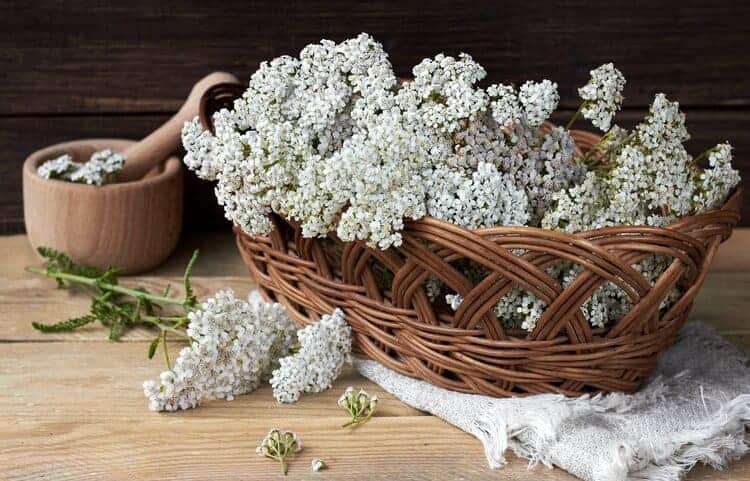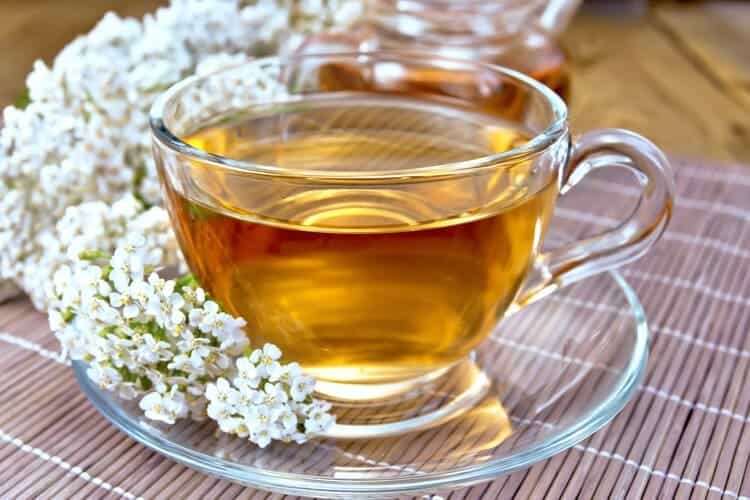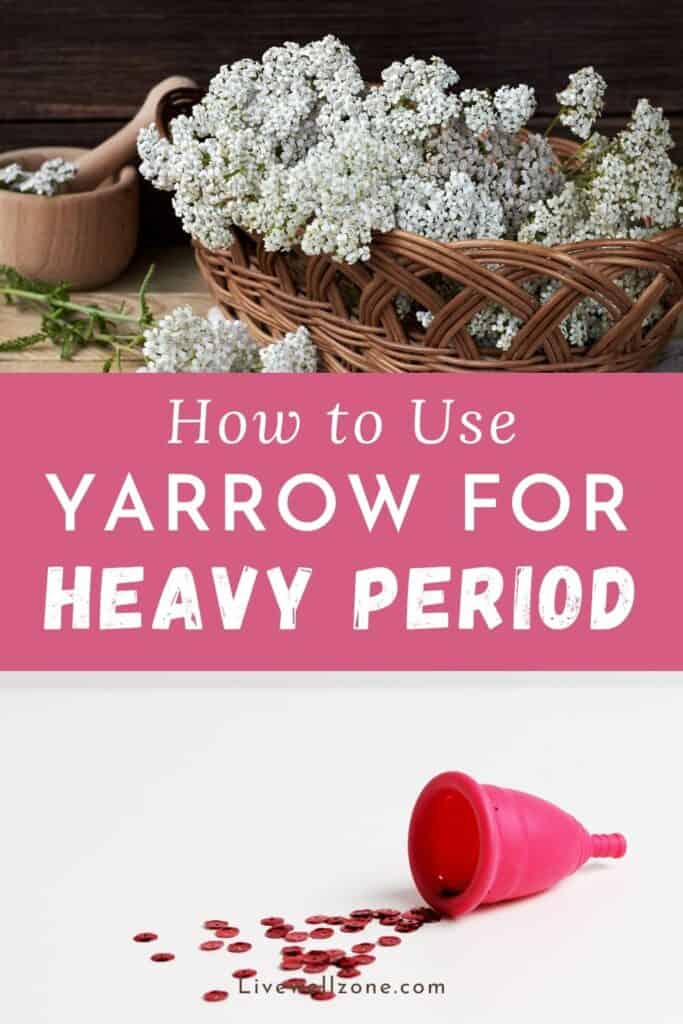
If there’s one herb that herbalists have relied on for quick relief from bleeding, it’s yarrow. This herb has been used for external wounds, internal wounds (such as ulcers in the GI tract) and yes, heavy menstrual bleeding.
In fact, yarrow’s ability to curb bleeding is reflected in its many names, which include soldier’s woundwort, bloodwort, stop-bleeding herb and nosebleed.
Furthermore, yarrow has some other impressive benefits – such as being astringent, anti-inflammatory and analgesic – that make it an herb worth paying attention to.
So, if you’re curious to learn more about yarrow, then keep reading because we’re going to look at:
- The benefits of yarrow for heavy periods (menorrhagia) and the menstrual cycle.
- How to use yarrow for a heavy flow.
- Some precautions to keep in mind when using yarrow.
NOTE: while yarrow is used as a natural remedy for excessive blood loss, it’s still essential that you address the underlying cause (which could be due to conditions like endometriosis, fibroids or estrogen dominance). So, please work with your physician to get a proper diagnosis and seek the right treatment.
Note: this post contains some affiliate links and I earn a commission (at no additional cost to you) if you use them to make a purchase.
BENEFITS OF YARROW FOR A HEAVY MENSTRUAL FLOW

1. Acts As A Uterine Tonic
Yarrow has a toning effect on the uterus, meaning that it is able to regulate blood flow to the uterus (source).
Interestingly, this characteristic means that yarrow can either increase or decrease blood flow, depending on the needs of the person.
With this characteristic in mind, it’s no wonder that yarrow has traditionally been used to curb a heavy flow and to stimulate menstruation, depending on the needs of the person.
2. Has Astringent Properties
Yarrow contain bitter compounds called tannins, which help to constrict tissue (source).
In addition, when it comes specifically to the reproductive system, astringent herbs like yarrow are known for improving both uterine and cervical bleeding (source).
3. Eases Cramps
Aside from helping with excessive menstrual bleeding, yarrow has traditionally been used to soothe menstrual cramps.
This is most likely due to the fact that yarrow seems to be:
- Analgesic i.e. it relieves pain (source).
- Antispasmodic i.e. it has the ability to curb muscle spasms in the uterus (source).
Since heavy bleeding and cramps tend to go together, this makes yarrow a noteworthy all-in-one natural remedy.
4. Supports Digestive Health
As we saw earlier, yarrow contains bitter compounds called tannins.
This is relevant for the digestive system because herbalists often use bitter foods to support the digestive system, particularly the liver.
Given that the liver plays an important role in hormone balance, this might be yet another reason why yarrow has historically helped women struggling with cramps or a heavy flow.
Interestingly, some test tube studies have shown that yarrow extract may help to reduce liver inflammation (source).
Furthermore, yarrow is rich in flavonoids and alkaloids, which help to soothe the digestive system.
Lastly, since yarrow has antispasmodic properties, it also helps to relax intestinal muscles, thus helping with an upset stomach (source).
HOW TO TAKE YARROW FOR HEAVY PERIODS: TEA, TINCTURE & CAPSULES
1. Capsules

A convenient way to take yarrow is in a capsule. One particular product to look into is Slow Flow from Vitanica.
Vitanica was created by Tori Hudson, a naturopathic doctor who’s best known for her work in female health (her book, Women’s Encyclopedia of Natural Medicine, is a handy resource to have at home).
This particular product combines yarrow with ingredients like:
- Shepherd’s Purse: another herb that is often used for heavy periods.
- Ginger: anti-inflammatory and has been studied for its effects on heavy menstrual cycles (source).
- Vitamin K1 (aka phylloquinone): an essential nutrient for blood clotting (source).
2. Tincture

A tincture is another convenient way to use yarrow.
The brand Herb Pharm sells a yarrow tincture, which they recommend taking by the dropperful, several times a day.
Since their recommendation is not specifically for heavy menstrual cycles only, it’s a good idea to check with your healthcare provider for a dosage that is tailored to your needs.
3. Yarrow Tea
If you enjoy making your own teas, then you have a few options:
- Make a yarrow tea by steeping 2 to 3 teaspoons of dried yarrow in 1 cup of hot water for 15 minutes. Drink this a couple of times a day.
- Combine 2 teaspoons yarrow with 2 teaspoons red raspberry leaf* and steep in 1 cup of water for 15 minutes. Drink a couple of cups per day.
* NOTE: Red raspberry leaf is an astringent and uterine tonic that is also a good source of vitamins and minerals (like vitamin C and iron). This herb is said to have an affinity for the female reproductive system and has traditionally been used to support the menstrual cycle, as a natural fertility aid and for postpartum recovery (source).
FAQs ABOUT YARROW AND EXCESSIVE MENSTRUAL BLEEDING
What are the side effects of yarrow?
Some possible side effects of yarrow include (source):
- Skin irritation (if used topically as a compress, for example).
- Drowsiness.
- More frequent urination.
In addition, yarrow is not considered safe during pregnancy or breastfeeding.
Furthermore, it is best not to combine yarrow with sedatives, antacids, lithium, anticoagulants or anti-inflammatory drugs.
If you have any doubts about how yarrow might interact with other drugs or herbs you are taking, please seek the guidance of your doctor.
CONCLUSION
Although there is limited scientific research on yarrow, its historical use shows that its been helping women for eons.
I hope that this article has helped you get a better understanding of what this herb has to offer.
For additional tips to support your cycle, check out the resources listed below.

Related Articles
10 Herbs for Heavy Menstrual Bleeding (That You Need To Know!)
The Power of Nettle Leaf for Your Period (and How to Use It)
Ginger Root for Heavy Periods: 3 Ways To Use It Effectively
A Simple Guide to Using Vitamin C for Heavy Menstrual Bleeding
Top Benefits of Vitamin K For Heavy Periods and How to Use It
What To Eat During Each Phase Of The Menstrual Cycle: A Quick Guide


